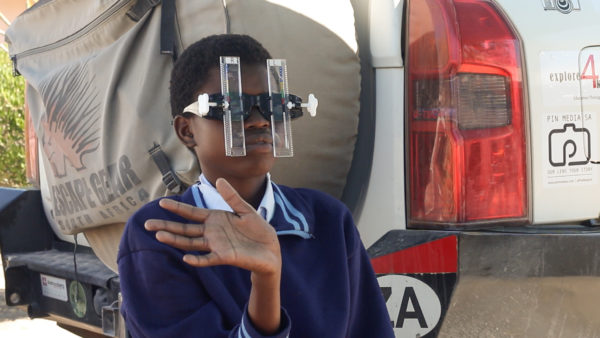An ambitious Johns Hopkins Center for Communication Programs proposal to easily bring eyeglasses to people who need them in four African countries has been named one of the Top 100 projects in an international competition for a $100 million grant.
The competition, run by the John D. and Catherine T. MacArthur Foundation, is called 100&Change and is designed to identify one of the world’s most critical social challenges and offer a solution that promises significant and durable change.
“One in seven people around the world has eyesight poor enough to require a pair of glasses but can’t get them,” says Susan Krenn, CCP’s executive director. “Starting in four countries, we will ensure that everyone has access to affordable vision care. Uncorrected vision limits productivity in school and the workplace and contributes to accidents and road traffic injuries. Good eyesight can make a real difference for some of the world’s most vulnerable people.”
Throughout Africa, it is estimated that 20-to-35 percent of people have vision impairments, but that 80 percent of them can be corrected with properly diagnosed eyeglasses.
The Top 100 projects represent the best 21 percent of competition submissions. The proposals were rigorously vetted and evaluated using four criteria: impactful, evidence-based, feasible and durable. MacArthur’s Board of Directors will select up to 10 finalists from these high-scoring proposals this spring.
In the inaugural round of 100&Change, Sesame Workshop and International Rescue Committee were awarded $100 million to educate young children displaced by conflict and persecution in the Syrian response region and to challenge the global system of humanitarian aid to focus more on building a foundation for future success for millions of young children.
CCP is partnering with OneSight, Global Vision 2020 and Business for Impact at the Georgetown University McDonough School of Business. OneSight has experience setting up sustainable vision centers. Global Vision 2020 has created a system to quickly train people to do eye exams and dispense glasses. Business for Impact will leverage their expertise to get private sector commitments and investments in eyecare.
The issue laid out by the CCP-led team is fourfold: There are not enough trained professionals to provide a correct prescription for eyeglasses; there are few places to get an eye exam and a pair of glasses; there’s a lack of awareness of what can be done to improve eyesight or where to go for help; and vision care and glasses are too expensive.
The proposal, “Let There Be Sight: Solving the eyeglass problem in Africa,” would create community vision centers providing eye exams and prescription eyeglasses. At the same time, outreach workers dubbed “visionpreneurs” would be trained – in a single day – to use an ultra-portable kit from USee to conduct onsite eye exams, determine a prescription and dispense custom prescription glasses in minutes to remote communities. They would also refer them to the closest vision center if additional services were needed.
The proposal also includes advocating with private sector employers to invest in vision care for their employees. And it would create a robust public health campaign to expand knowledge of vision care, build demand for services and foster public and private investment in the eyecare system. The result: a fully sustainable, locally-owned system for protecting eyesight.
“Services and eyewear will be provided at prices that people in these communities can afford,” Krenn says. “And after three years, vision centers we would create would be self-sustaining. It’s an exciting project that could make a huge difference to people.”
CCP’s $100 million proposal would bring the project to Ghana, Madagascar, Mozambique and Tanzania.
While only one project in the Top 100 will be funded by MacArthur, part of the goal of the foundation is to connect other donors with the organizations whose proposals made the Top 100. Descriptions of the Top 100 projects will appear on the Lever for Change website. Since the inaugural competition, other funders and philanthropists have committed an additional $419 million to date to support bold solutions by 100&Change applicants.
“MacArthur seeks to generate increased recognition, exposure, and support for the high-impact ideas designated as the Top 100,” says MacArthur’s Cecilia Conrad, CEO of Lever for Change and the leader of 100&Change. “Based on our experience in the first round of 100&Change, we know the competition will produce multiple compelling and fundable ideas. We are committed to matching philanthropists with powerful solutions and problem solvers to accelerate social change.”


